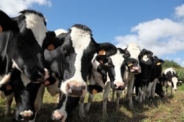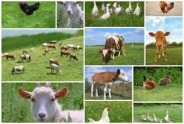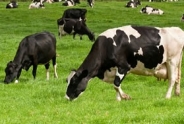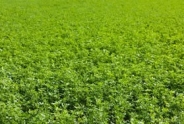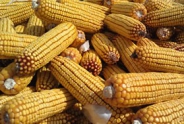The Calves of Summer
Jerry Bertoldo, Dairy
Northwest New York Dairy, Livestock & Field Crops
April 11, 2013
Calves do have some advantage over adult cattle regarding thermal stress. They do not have the heat production of the rumen nor the small surface to body mass ratio that limits radiant heat loss in cows. Indoor calf housing provides shade, but often has poor ventilation and unhealthy air. Hutches offer the best air freshness, but minimal protection from the heat on a sultry summer day.
Calves under three weeks of age have a thermoneutral zone between 59 and 78 degrees or so. This means that within this temperature range, without wind, a wet hair coat, direct sun or oppressive humidity, a young calf needs no extra energy to stay warm or keep cool. Beyond three weeks of age the calf likes it cooler. As it ages 70 degrees becomes the upper comfort zone similar to that of adult animals.
Calves that get heat stressed try to cool themselves just like cows. They increase their respiration rate, panting if necessary. Their metabolic rate increases with the rise in body temperature. Their loss of water through respiration increases. The caloric or energy consumption jumps up as well. More energy is diverted from growth to metabolism as calves breathe faster and often become restless due to discomfort. Rates of gain suffer if feeding rates are not adjusted upward. These conditions lead to the release of stress mediated steroids such as cortisol that suppress immune response and higher incidence of disease.
Things to keep in mind....
- Baby calves will drink 1-2 gallons of water/day (not including that used to make up milk replacer)
- Calves should spend about 75% of their time lying down 55% in the daylight, nearly 100% at night
- Straw bedding attracts the most flies
- Pea gravel or sand makes comfortable and cooling surface in hot weather
- Any bedding loaded with manure and urine is a source of flies and bacteria as is the area in front of calf pens or hutches where water and feed spill
- Fans will cool calves, dry up bedding and discourage flies
- Water and milk dampened starter spoils quickly in warm weather
- Calves eat more starter between 6 pm and 6 am in hot weather - freshen up starter in the evening rather than morning
- Temperatures over 85 degrees resulting in elevated body temperatures lead to vaccination failures. Immunizes calves in the cool of the morning preferably
Upcoming Events
Cornell Cow Convos Podcast- Episode 8 Release
April 25, 2024
Cornell Cow Convos-Episode 8
Western NY Value-Added Dairy Discussion Group: Jess May- Farm Credit East Webinar
May 2, 2024 : Value-Added Dairy Discussion Group Webinar: Jess May- Farm Credit East
Western NY Value-Added Dairy Discussion Group: Eden Valley Creamery
May 3, 2024
South Dayton, NY
Announcements
Follow us on Instagram
See photos and reels of our most recent events and programs!Join us on Facebook!
Follow us on Facebook to get up to date posts about events, workshops and everything NWNY!Add us on LinkedIn!
Connect with us on LinkedIn to get more information about upcoming workshops and programs!

